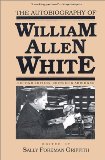

 |

|

The average rating for The Autobiography of William Allen White based on 2 reviews is 4.5 stars.
Review # 1 was written on 2018-08-07 00:00:00 Brian Dalbol Brian DalbolA work that feels oddly current. It was a slow start, reading The Autobiography of William Allen White. His handling of his boyhood is inept; it seemed as though White lacked the talent for narrative, especially narrative that spanned memory. This improved as the work unfolded, but it was not so much from the fashioning of a good narrative as from the emergence of the author's other, evident strengths. Portraiture is one of these strengths. White's depiction of Mark Hanna, for instance, and of many another prominent figure of his time. Female figures, not so much. Edna Ferber, for instance, appears repeatedly, but more as furniture than as agent. Personal development, too, emerges - sometimes a little awkwardly, but it is there. By the time we come to the Mary White editorial, we are ready for it. The personal development is essential to the book, for through much of its span, White is not an attractive figure. He is a self-centered smartass. He is chastened, seasoned, and stimulated by his times, embracing a broad range of reforms and relationships. His chronicle of the reform era from the vantage of Exchange Street, Emporia, is an irreplaceable perspective on the times. Perhaps I am personally inclined to identify with a fellow who is fundamentally conservative but is propelled through his times by an awakening moral sense. I lived on Exchange Street for the better part of a decade myself, and thus am equipped to note the limits of White's progressivism. White lived, I mean he resided physically, on the boundary between comfortable white Emporia and marginal black Emporia. White would have considered himself color-blind. I think he was comfortably blind to much that he should have seen. Finally, through the final chapters of the book, I could not help reflecting on our American situation a century on from White's heyday. White was distressed by reactionary developments, while still animated by old loyalties. When overt bigotry impinged on his own community, he went on the offensive along with the better angels. His position, and his response, are worthy of study today. |
Review # 2 was written on 2016-12-20 00:00:00 Alan Fooks Alan FooksEndless journalistic citations of William Allen White irritated me in my 60s teens enough never to want to read it, but now I see its virtue: for anyone who wants a feeling for mainstream progressive political culture in the United States (which was, until Woodrow Wilson, an almost exclusively GOP affair), this is spectacular. It's also important as a description of the difference between "settled" midwestern states east of and on the Mississippi in post-Civil War culture and the frontier but not wild west states. WAW knew Teddy Roosevelt well, got to know McKinley, Mark Hanna, Bryan, Jane Addams, Taft, and Harding. His judgment of men and women is superb. WAW wrote the original "what's the matter with Kansas" editorial in the 1896s, which was a complaint about high taxes driving away business and jobs from his state - about as far from that idiot Thomas Frank as you can get. |
CAN'T FIND WHAT YOU'RE LOOKING FOR? CLICK HERE!!!